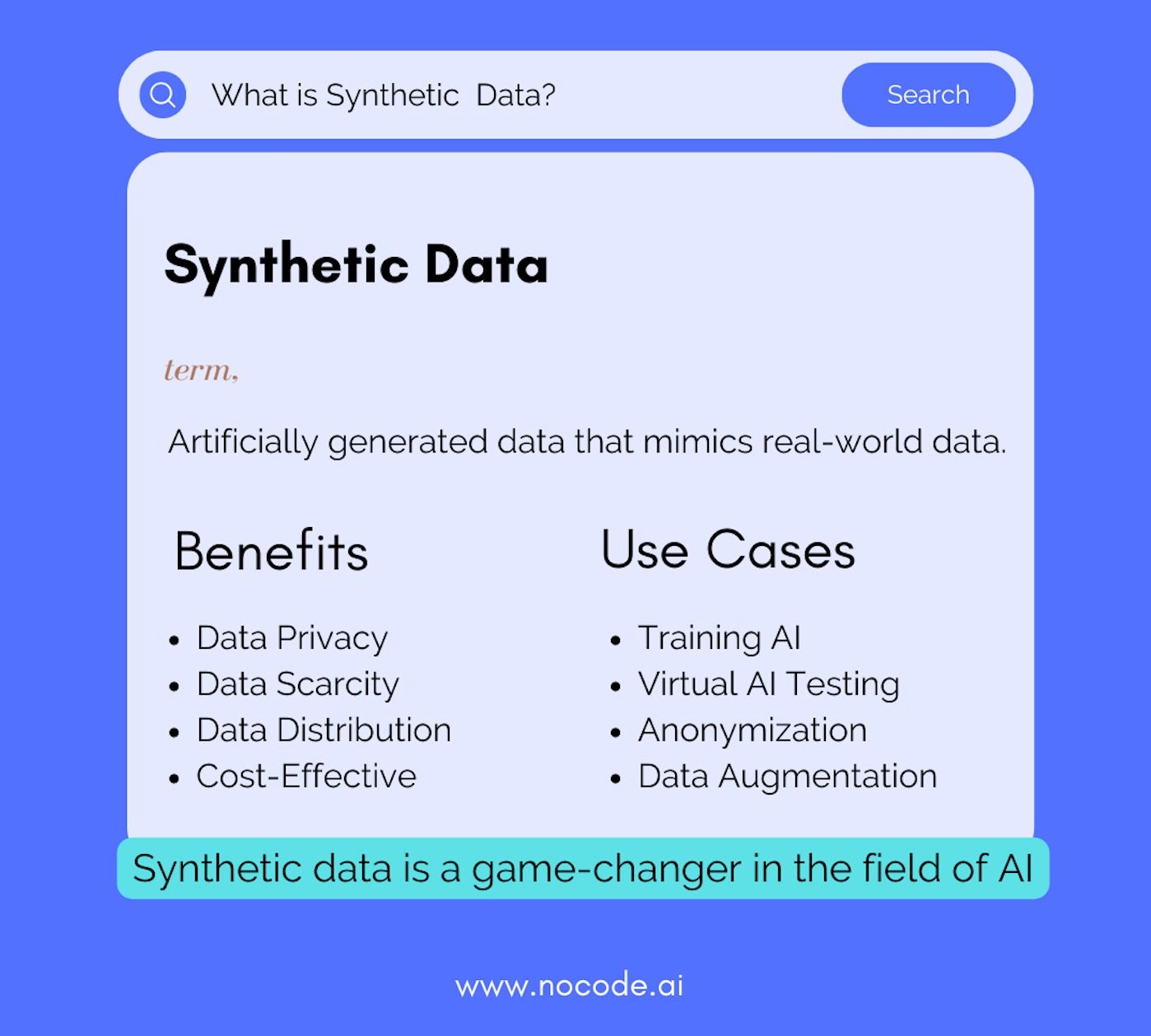Artificial Intelligence (AI) and Machine Learning (ML) have revolutionized the business world by automating various processes, reducing costs, and improving decision-making accuracy. However, these technologies rely heavily on high-quality data to train algorithms, and the scarcity of data can limit their effectiveness. This is where synthetic data comes into play.
What is Synthetic Data?
The definition:
Synthetic data refers to artificially generated data that mimics real-world data.
It is designed to provide a solution to the limitations posed by real-world data, including privacy concerns, data scarcity, and limitations in data distribution. Synthetic data can be used to train and test AI and ML algorithms, making it a game changer in the field of data science.
Benefits of Synthetic Data for Businesses
- Data Privacy: The use of real-world data often raises privacy concerns, as sensitive information can be leaked. Synthetic data eliminates this risk, as it is created from scratch and does not contain any real-world information.
- Data Scarcity: Many businesses face limitations in data availability, which can limit the effectiveness of AI and ML algorithms. Synthetic data provides a solution to this problem, as it can be generated in large quantities without any restrictions.
- Data Distribution: Real-world data can often be biased, which can lead to inaccuracies in AI and ML models. Synthetic data eliminates this issue, as it can be designed to have a balanced distribution of variables.
- Cost-Effective: The generation and labeling of real-world data can be time-consuming and expensive. Synthetic data, on the other hand, can be generated quickly and inexpensively, making it a cost-effective solution for businesses.
Use Cases for Synthetic Data in Business
- Training and Validation of AI and ML Algorithms: Synthetic data can be used to train and validate AI and ML algorithms, allowing businesses to develop and fine-tune their models.
- Virtual Testing Environment: Synthetic data can be used to create a virtual testing environment for AI and ML models, allowing businesses to test their algorithms in a controlled and safe environment.
- Anonymization of Sensitive Information: Synthetic data can be used to anonymize sensitive information, making it possible for businesses to share data without risking privacy violations.
- Data Augmentation: Synthetic data can be used to augment real-world data, increasing the quantity and diversity of data available for AI and ML algorithms.

Synthetic Data generation using Generative AI
Synthetic data provides unlimited annotated data that can be generated through computer simulations or AI-generated models like DALL-E for images and GPT for text. Synthetic data can be procured on demand, customized, and produced in vast quantities.
One of the most significant benefits of using synthetic data for training machine learning models is that it comes pre-labeled. Unlike real-world data, which requires time-consuming and expensive manual annotation, synthetic data is generated by a machine that already understands the data, eliminating the need for human intervention. This is especially important in scenarios where the manual annotation is either not feasible or impractical.
For example, annotating a large dataset of images, such as satellite imagery or medical images, can be a daunting task that requires specialized knowledge and extensive manual effort. Synthetic data can be generated to include the desired labels, making it easier to train machine-learning models.
Similarly, annotating audio files or speech data can be challenging, especially in cases where the data is in a language that the annotators are not familiar with. With synthetic data, it is possible to generate large amounts of labeled speech data in any language, making it easier to train speech recognition models.
Synthetic Data tools in the market
There are several synthetic data tools available in the market, and the best one for you will depend on your specific needs and requirements. I would like to highlight a few:
- IBM Unreal Data: An enterprise cloud platform for creating scalable AI-based simulations across business domains using statistical data relationships. Millions of AI agents are trained to bring unreal data to life with realistic, yet synthetic choices.
- Gretel.ai: A startup that provides a platform to generate accurate and safe synthetic data, on demand. Safely incorporate generative AI into your data. Stay tuned to the interview with Alex Watson, co-founder, and CTO, here in the community.
- Tonic.ai - Real Fake Data: Say goodbye to inefficient in-house workarounds and clunky legacy tools. The data you need is useful, realistic, safe—and accessible by way of API.
- Mostly.ai: They enable organizations to thrive ethically and responsibly with smart and safe synthetic data.
Here is a list of companies providing structured or unstructured synthetic data products and services: https://elise-deux.medium.com/new-list-of-synthetic-data-vendors-2022-f06dbe91784
Accelerating ROI by combining Synthetic Data and No-Code AI tools
By combining synthetic data with no-code AI tools, businesses can accelerate their return on investment and drive significant business value. No-code AI platforms that utilize synthetic data allow non-technical users to quickly and easily create models that can automate tasks, make better decisions, and generate new insights. These models can improve operational efficiency, reduce costs, and drive revenue growth, all while minimizing the risk of data privacy violations and ensuring the accuracy and quality of data. With synthetic data and no-code AI tools, businesses can realize the full potential of AI and unlock new avenues for growth and value creation.
Conclusion
Synthetic data is a game-changer in the field of AI and ML, offering businesses a cost-effective and safe solution to the limitations posed by real-world data. From data privacy to data scarcity, synthetic data provides a solution to various challenges faced by businesses, making it a valuable tool for data scientists and businesses alike. With the advancements in synthetic data generation technology, it is only a matter of time before synthetic data becomes a standard tool for businesses to leverage AI and ML to improve their operations.
